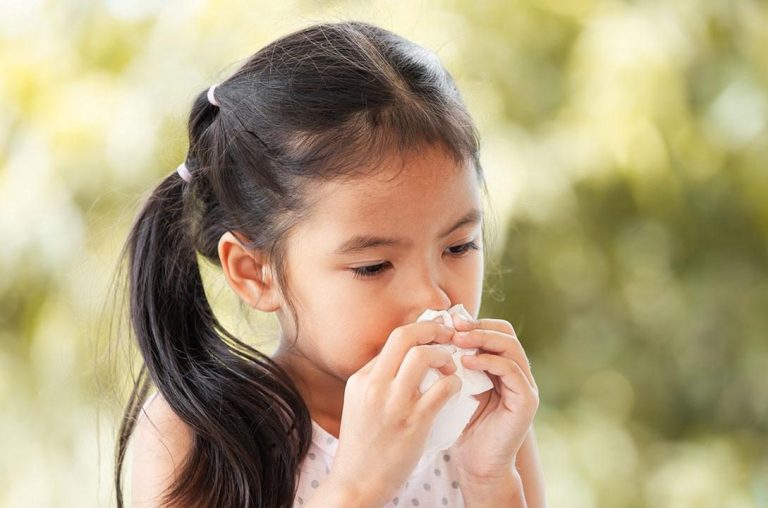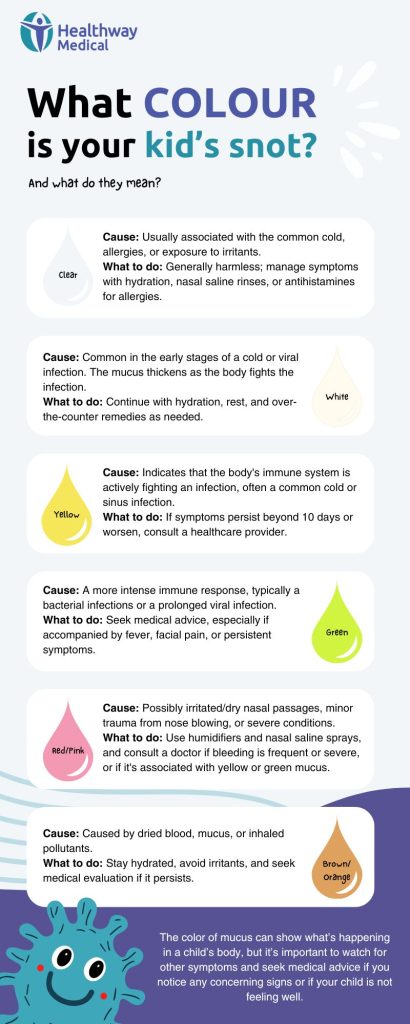Runny Nose in Kids: The Snot Colours

As parents, it’s natural to be concerned when our little one develops a runny nose. While runny noses are frequent in children and are usually harmless, it’s essential to know how to manage them and when to seek medical advice.
Due to their still-developing immune systems, children are especially vulnerable to viral infections, which can lead to frequent upper respiratory infections. A child with a runny nose may exhibit signs of nasal congestion, frequent nose wiping, and possibly clear or slightly discoloured nasal discharge, which can vary in severity.
Causes
A runny nose is a common symptom with several potential causes. It is commonly associated with:
- Viral Infections: Common cold viruses may cause nasal congestion, sneezing, and clear discharge.
- Allergies: House dust mites, pet dander, mould, and other environmental allergens can cause a runny nose in children. Allergic rhinitis often manifests as a runny nose, sneezing, nasal itching, or congestion.
- Environmental Irritants: Exposure to irritants such as tobacco smoke, pollution, or strong odours can cause a runny nose.
- Sinusitis (Sinus Infection): Symptoms may include a runny nose, thick yellow or green mucus, facial pain or pressure, headache, and fever.
Risk Factors
Certain factors may increase the likelihood of a runny nose in children and worsen the severity of symptoms:
- Age: Young children, especially toddlers, are more susceptible due to their developing immune systems.
- Allergic Predisposition: A family history of allergies may increase the risk of allergic rhinitis.
- Frequent Exposure to Irritants: Frequent exposure to tobacco smoke or indoor pollutants can irritate the nasal passages.
Sometimes, a runny nose can be a sign of something a bit more unusual. It’s good to keep an eye out for these less common causes to ensure your child receives the proper care. Here are some things to look out for:

Foreign Bodies: A runny nose, especially if persistent on one side, may be caused by a foreign object lodged in the nose.
What to do: Supervise young children closely and seek medical attention immediately if a foreign object is suspected.

Nasal Polyps: Noncancerous growths in the nasal passages can obstruct airflow and cause a runny nose.
What to do: If your child suffers from chronic nasal congestion, frequent sinus infections, or a persistent runny nose, see your doctor. A doctor can diagnose nasal polyps and recommend appropriate treatment, which may include medication or surgery.

Deviated Septum: A deviated nasal septum, where the thin wall between the nostrils is displaced, can cause nasal obstruction and a runny nose.
What to do: If your child experiences persistent nasal obstruction, difficulty breathing through the nose, or a runny nose that doesn’t improve with standard treatments, seek medical evaluation.
How to Care for Children with a Runny Nose
1. Home Care for Viral Infections:
- Humidifiers and Saline Drops: Keep the air moist using a humidifier and use saline nasal drops to clear nasal passages.
- Hydration and Rest: Provide adequate hydration and rest for your child. Warm fluids, such as soups or teas, can help relieve congestion.
- Sleeping Position: Elevate your child’s head while sleeping to help reduce nasal congestion.
2. Allergy Management:
- Avoid Allergens: Identify and minimise exposure to allergens such as house dust mites and pet dander.
- Medications: Use antihistamines or allergy medications as prescribed by a healthcare provider.
- Immunotherapy: For severe allergic rhinitis, immunotherapy can help build tolerance in children with severe allergic rhinitis by gradually exposing them to increasing doses of the allergen.
3. Minimising Environmental Irritants:
- Reduce Exposure: Use air purifiers and ensure good ventilation to reduce exposure to pollutants, strong odours, and irritants.
4. Sinusitis (Sinus Infection) Care:
- Warm Compresses: Apply warm compresses to the face to relieve sinus pressure and discomfort.
- Medical Attention: If symptoms persist, worsen, or include severe pain or fever, consult a healthcare provider. Antibiotics or other treatments may be necessary.
5. Over-the-Counter Medications:
For older children, some over-the-counter cold medications may be used, but always consult a healthcare provider before use, as they may not be suitable for all ages or conditions.

Snot Colour Code:
The colour of nasal discharge can provide clues about the underlying cause of a runny nose. Here’s a quick guide to understanding the different colours of nasal discharge and what they could mean.
When to See a Doctor
While most cases of runny noses in children are mild and self-limiting, there are some situations when you should consult a doctor:
- High Fever: If your child has a high fever (38°C or 100.4°F or higher) and a runny nose, it may indicate a serious illness requiring medical attention.
- Breathing Difficulties: Signs of rapid breathing, chest retractions, or wheezing require immediate medical attention.
- Persistent Symptoms: If your child’s runny nose persists or worsens after home care, seek medical attention.
In these cases, it is critical not to delay seeking medical attention. Timely intervention can help avoid complications and ensure your child receives the best possible treatment.
Conclusion
In conclusion, a runny nose in children is common and can be caused by viral infections, allergies, or environmental factors. With proper home care, parents can manage the condition effectively. However, it’s critical to consider the severity and duration of symptoms. If you are concerned about your child’s runny nose, seek professional help from the SBCC Baby and Child Clinic in Singapore. Your child’s health and comfort are our top priorities, and we are committed to providing quality care for your family.
Remember that every child is different, and tailored management of a runny nose can make a big difference. By staying informed and seeking professional advice when necessary, you can effectively ensure your child’s well-being and navigate the challenges of a runny nose.






